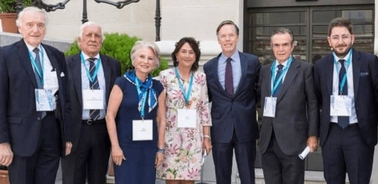IE University joins forces with Harvard and the Rafael del Pino Foundation to reflect & strategize at the 2018 Transatlantic Conference

Madrid, July 6, 2018. The future of transatlantic relations was the central issue discussed this weekend at the Transatlantic Conference, an international event organized in Madrid and Segovia by Harvard Kennedy School, IE School of Politics, Economics & Global Affairs, and the Rafael del Pino Foundation.
Leading experts in the field from around the world examined the causes driving the transatlantic crisis and its impact on international politics on both sides of the Atlantic. Nicholas Burns, the Roy and Barbara Goodman Professor of the Practice of Diplomacy and International Relations at the Harvard Kennedy School and Faculty Chair of its new Project on Europe and the Transatlantic Relationship, presided over the opening session of the conference along with Diego del Alcázar, President of IE University, and María del Pino, President of the Rafael del Pino Foundation. Burns emphasized the conference’s objective to “convene leading officials, journalists, and academics from both sides of the Atlantic to strengthen the politics, economics, and security of an alliance that has anchored global order for 70 years.”
The conference commenced at the headquarters of the Rafael del Pino Foundation in Madrid and continued throughout the weekend at IE University’s Segovia location. Participating experts centered on issues that included the ambivalent position of the United States toward NATO; the way it perceives the European Union as an economic competitor rather than a strategic partner; and the diminishing leadership role of the United States in areas like world trade, climate change and the defense of human rights. Speakers also examined the impact of Brexit in Europe, terrorism, the immigration crisis and the growth of anti-democratic populism in Latin America. They went on to analyze the consequences of these challenges on transatlantic security, the resilience of Western democracy, the future of the global economy and the policies of emerging powers like China.
Underscoring the relevance of the conference, Professor Burns noted, “At a time when we are facing the most serious transatlantic crisis in seven decades with the US–EU trade war and President Trump’s public doubts about NATO, the need to revitalize the relationship between the US and Europe is as urgent as it is important.”
In addition, Manuel Muñiz, Dean of IE School of Politics, Economics & Global Affairs, spoke about how the transatlantic alliance has been the central pillar of the liberal order for decades. “Some have spoken of the existence of a true Atlantic civilization with shared values, interests and institutions. The peoples that live within its boundaries have enjoyed long-lasting peace and prosperity. However, this order is today questioned not just by forces outside of it but also from within. With this conference, we seek to study the drivers and consequences of the transatlantic fracture that we are witnessing.”
Vicente Montes, Director of the Rafael del Pino Foundation, paused to reflect on the role of Spain, the conference’s host country, in the efforts to uphold mutually beneficial international relationships: “The determination shown in recent decades by democratic governments on both sides of the Atlantic Ocean to consolidate the standards of co-existence enshrined in the so-called liberal order have helped drive levels of freedom, prosperity and solidarity in the world. Spain once played a decidedly key role in creating transatlantic connections and now strives to make a major contribution to upholding Western values through an approach that is both open and shared on a global level.”
Regarding the Rafael del Pino Foundation’s aspirations for the event, Montes added, “As co-organizer of this conference, the Foundation hopes to help strengthen transatlantic dialogue in general, and in particular to drive universal values which, like the laws and international institutions that bring order to trade flows, peacekeeping efforts, and protection of the environment and human rights, are essential in shaping a global agenda on which future peace and freedom depends.”